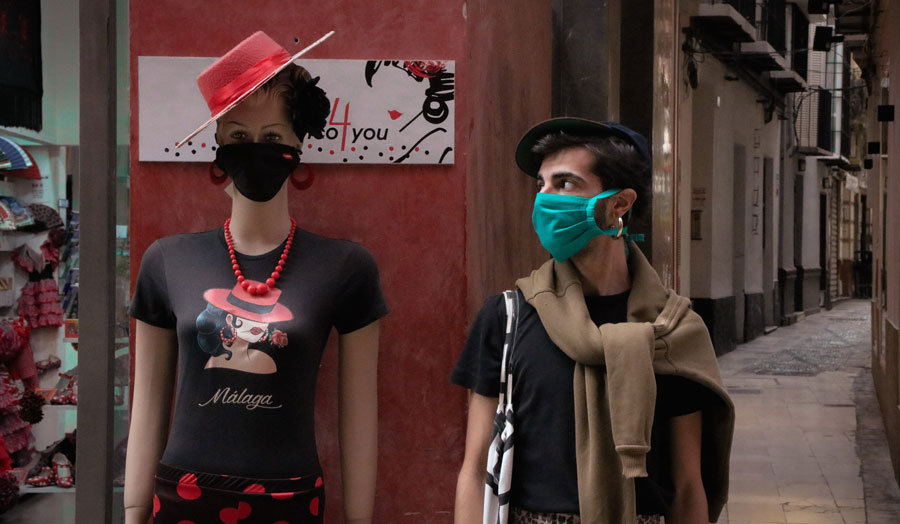London Met Journalism students report on the latest 'Newsweek', which sees students prepare radio, TV, print and online packages about a specific topic.
Date: 29 March 2021
By Agatha Kempf (BA Photojournalism), Cheryne Fourdrigniez (BA Journalism) and Giulia Mura (BA Journalism)
London Met Journalism hosted a virtual debate with expert panellists to discuss how COVID-19 has impacted fashion trends, and what effect this will have on the environment and issues of sustainability.
The debate was part of Journalism’s regular "newsweeks", where students spend three days preparing radio, TV, print and online packages about a specific topic, creating the atmosphere of a real newsroom. Students prepared questions in advance, which they put to the expert panel.
The experts shared insights on the relationships we have with clothing and fashion trends amidst the pandemic. The panel was comprised of Black Beauty & Hair editor Irene Shelley; fashion entrepreneur Barry Laden MBE; Alex Erinle, CEO of Thrill Digital, Sabinna Rachimova of fashion label SABINNA and Lauretta Roberts, editor and co-founder of TheIndustry.fashion.
According to RSA House, 52% of people expect to change their fashion habits post-COVID. A third of women also say that they will be purchasing less clothing because of the pandemic.
"I think there will be an element of comfort in future trends but I do firmly believe that one of the areas of fashion that will bounce back quite quickly is formal wear," Roberts told students, guests and staff.
In response to the event’s name, Laden cried out: "Do we care what we wear!? Let’s hope we do. Otherwise we might as well pack up." He was wearing a bold-striped vintage Agnes B jacket that was at least 15 years old, which caught the attention of many.
The discussion turned to future businesses and the importance of sustainability and ethics within the fashion industry.
"The whole industry is built on exploitation so there needs to be a shift," said Rachimova, who in 2019 made it to the coveted Forbes 30 Under 30 list. "Whoever starts businesses now should really think about the concept as a whole in order to treat everyone properly and get rid of the hierarchy."
Shelley shared her dissatisfaction with the fact that Black beauty products have been put aside this past year, leading the industry to lose millions. In certain shops, Black beauty products aisles were closed, while other beauty aisles remained open.
"I have a problem with Afro hair shops not being seen as essential," she said, adding that not enough synthetic hair used in weaves and extensions is sustainable.
Although there seems to be a rise in awareness of sustainability in the fashion industry, Rachimova thinks its abrupt popularity is not serving the movement.
"All of a sudden being sustainable became a trend, without people really understanding the essence of it," she said.
"That was really dangerous because it allowed companies to green-wash a lot of their products."
She asked if it was possible for businesses to be truly sustainable if the mentality is to push people to buy and consume.
"No business brand can truly be sustainable because they produce products people don’t always need. They still push consumerism," says Rachimova.
With lockdown restrictions to be lifted on 12 April, questions were raised on what the future of the high street might look like.
Rachimova said: "There will be a shift, something will change in customer behaviour, the way we approach shopping will change and you will see a lot of companies trying to offer a combination of digital and in-store shopping experiences."
Roberts added that although there will be fewer shops on the high street, there are no surprises in the brands that we’ve already lost.
According to an article published in The Guardian, over 17,532 outlets have closed down across the UK in 2020.
Laden, who also believes that the high street is changing, says that it will be the stores that supply a sensory experience for customers which will survive in the future.
"There is an opportunity now to create innovative solutions. Someone is going to come up with very cool stuff," said Erinle.
Added Shelley: "I enjoy shopping online but I think there will be a change in the high street. It is happening in the beauty industry where technologies are used to find your base shade. Maybe this method can also appear in fashion. I don't know what's going to happen but I'm excited."
To see more student work, visit The Holloway Express website.

